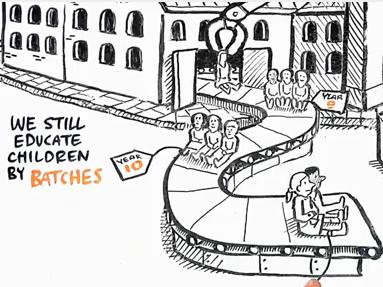Happy New Year — new ideas. Agenda for class January 6.
Dear Scholars,
We covered lots of ground in fall and many wonderful projects were submitted.
We have read and listened to some of the best examples of formal English language usage, have kept our vocabulary journals and have explored grammatical and poetic subjects as well as expressive language devices. In addition to continuing these, let’s experiment with some new approaches to writing.

We have watched Ken Robinson’s Changing Education Paradigms in which he discusses ways to improve education — methodologies for allowing students to find their own best ways to learn. Please watch it again if you do not remember it. These concepts are reflected in many works on the advantages of homeschooling. Some specific ideas worth noting:
- Divergent thinking
- creativity
- Moving away from mass-production education
- Waking students up to what’s inside instead of putting them to sleep
Recent studies have demonstrated that different approaches to learning can be far more effective than the traditional classroom filled with students all the same age level working separately. Let’s explore some new material and methodologies for studying formal English. Here are a few thoughts to start with; please add more:
- Dramatic and comedic dialog writing.
- Research and research paper writing the easy way.
- Rewriting and editing — starting with an existing work and producing something new and different.
- Skit writing and production.
- Comic monologue writing.
- Letter writing — from personal correspondence to business letters and applications.
- Let’s see how much fun Shakespeare can be. Perhaps we will write some of our own pseudoshakespeare.
- Collaborative story writing — groups of different sizes working together.
- Completing and publishing our literary journal issue and starting on the next one.
Remember: We are looking for new and inspiring thoughts. The only restriction on projects and activities is that we must try to express them in formal English. There is no “don’t copy” rule! Copying is one of the best ways to learn a complex subject (we’ll just cite our sources).
Assignments:
Submit your own suggestions regarding subject matter and the writing process. What would you like to write about, with whom and under what conditions?
Please bring to class any appropriate material that has inspired you and which demonstrates language or ideas that you feel would be of value to the rest of the class: videos, articles, books, films — whatever you find interesting.
Traditional teachers, schools and even parents are still unwilling to consider alternative learning paradigms that break tradition and work with students of multiple ages, often abjuring methods and material that appear to be “not age appropriate” — and it is very hard to combat this misconception. Can you think of ways to welcome older and younger learners to the class? Do you know older or younger people (siblings, parents?) who would enjoy and benefit from the class?
Another short article on language learning has been posted: Learning Languages Like Children, which applies more to ESL students but does importantly emphasize the value of listening. You may find it interesting. What do you think of the ideas presented?
